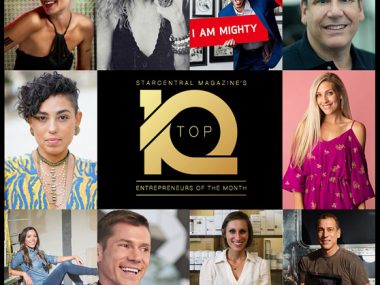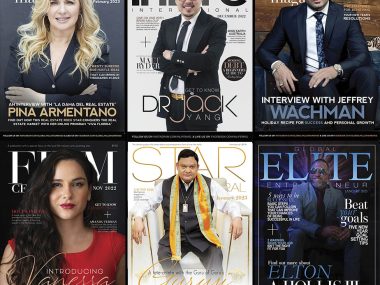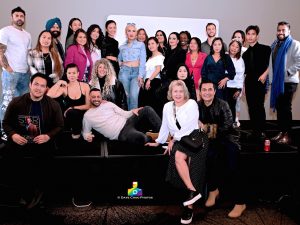Photo supplied by Lou Rom of The Rom Group
This entrepreneur confessed that when he started his business he had no idea what he was doing, fast forward to today and his business is now an Inc. 5000 fastest-growing company for four straight years.
Frankie Russo was raised in a family of entrepreneurs. His father owned a fashion clothing store for many years before deciding to change direction and going into inner-city work with the homeless. He started his entrepreneurial journey by selling t-shirts to his high school friends, afterward, he became a server at a restaurant after high school. After a chance meeting with a mortgage broker at a table, he was serving in the restaurant he used to work for, he became a part-time mortgage originator. This gave him an early jump start on his real estate career which lasted eight years and included starting her own brokerage firm with 15 salespeople.
When the mortgage crisis came in 2008, his business went down, but luckily one year before the crisis he already started a small company with his brother who just graduated graphic design – that company was Potenza. Initially, they had no idea what they were doing so they had to rely on the needs of their clients to guide them to the direction they need to take their company to. It took them five years to even figure out what Potenza really was and now it’s a leading full-service 360 marketing firm, and an Inc. 5000 fastest-growing company for four straight years.
StarCentral Magazine recently sat down with Frankie to find out more about his journey to entrepreneurship and here’s what went down.
Could you please tell our readers a brief background about yourself and how you started your business?
I was raised in a family of self-starters. My dad had his own fashion clothing store for many years before changing directions and going into inner-city work with the homeless. Our family started homeless shelters and ran those for two decades. When I got out of high school and went to college, I quickly learned that a part-time mortgage originator would be the best gig I could do with the limited hours I had available after the commitments for college. This gave me an early jump start on my real estate career which lasted eight years and included starting my own brokerage firm with 15 salespeople. That all came to a screeching halt in 2008 with the mortgage crisis. Luckily, one year before the crisis I decided to start a small company with my little brother who just graduated graphic design. That company was called Potenza.
Can you describe your journey to success? When did you start? Did you ever imagine you would become this successful?
I started out selling t-shirts at my high school then I became a server at a restaurant after high school. After meeting a mortgage broker at a table I was serving in the restaurant, I became a part-time mortgage originator which was the best gig I could do with the limited hours I had available after the commitments for college. This gave me an early jump start on my real estate career which lasted eight years and included starting my own brokerage firm with 15 salespeople. That all came to a screeching halt in 2008 with the mortgage crisis. Luckily one year before the crisis I decided to start a small company with my little brother who just graduated graphic design. That company was called Potenza. The truth is, we had no idea what we were doing…. which was the best thing that ever happened to us. We had to rely on the needs of our clients to tell us what direction we will take our company. And since we were in the middle of a recession and for the first time local businesses were starting to use online media; it was the perfect dust storm for us to emerge from. We would get a client and give that client everything we had. Then get another client, and we continued to provide that client the same treatment. It took us five years to even figure out what Potenza was. And I spent the next five years reinventing that definition.
What are you currently doing to maintain/grow your business?
Reinventing the ad agency model by continuing to enhance our marketing automation and attribution software “ReturnFlight.” We have also created a wholesale division that allows for other ad agencies and media companies to reinvent themselves by white labeling our software to give them a competitive edge as well in their markets. At this stage in the game, if you’re not using data and technology to fuel your marketing decisions and create your highly personalized marketing messaging, you aren’t going to be able to compete.
Writing a book and doing talks to business communities has also been a very effective way to stand out in an overcrowded industry.
Lastly, having content generated and published constantly about the problems you are solving in your industry is a great way to attract the right type of customers to your business. I believe attraction is better than promotion when it comes to business. I always try and make sure I have something that “they” want to stay attractive. This creates a magnet for your business that attracts new customers.
How did your brand stand out from the rest of the other brands out there that is similar to your niche?
We always thought differently. We positioned ourselves as an outlier that was not a traditional version of our company (ad agency). We built things in-house that other companies outsourced. Early on we were one of the only ad agencies in the area that had her own internal video production department. A few years later we were the only add agency that had an internal digital advertising department. And eventually, we created our own software product that gave us a huge proprietary niche. This enabled us to build a business that helps other ad agencies and media companies to conquer the niche in their market.
What is the toughest decision you had to make in the last few months?
The toughest decision I’ve had to make in the past few months is allowing my company to evolve by getting out of the way. Last year I hired some important executive staff including a chief operating officer. I learned several years ago at one of the first Inc 5000 conferences I attended that founders make crappy CEO’s. Well, this is very hard to hear, this is one of the best pieces of advice I’ve ever received. As a founder, I can only take the company so far before I start ramming into a glass ceiling. Today I realize that it is my thought leadership and vision that is most valuable to the company since we are now too big for me to run it as we did at the beginning. This hard decision to let go and not micromanage has opened up the next chapter of our business for even more immense growth then we have already seen.
What money mistakes have you made along the way that others can learn from (or something you’d do differently)?
I’m very grateful that I never had to take investment capital or get large lines of credit from banks. However, if I did it over again, I would strategically have partners that could bring investment money to the table earlier in the process as well as offer strategic business opportunities to grow our business faster. I also learned that I could never have too many business mentors who had gone before me and made money mistakes that I can avoid by letting them mentor me as I grow.
What have you learned in the process of becoming wealthy that others can learn from?
Never stop reinvesting into yourself. I made a decision early on to not divert any profits from my business into other investments like real estate and the stock market until I had fully invested in my own companies and products. As the primary shareholder of my companies, I am most important Investor.
What new business would you love to start?
I would say a music record label, but I just started one of those. I I think my next frontier will be a new business for capital ventures. I would love to be a mentor and Investor in many companies as a minority shareholder to be a part of a lot of different innovation and industries without having to be the main driver of the business.
If you could go back in a time machine to the time when you were just getting started, what would you do differently? What advice would you give yourself?
Don’t flinch. Never stop going all out and fail fast because your failures will bring out your highest value to your stakeholders, employees, and customers.










